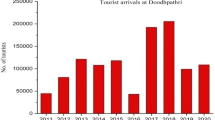Abstract
Indigenous knowledge plays a pivotal socioeconomic development role in indigenous communities. In Kenya, one of the economic sectors where indigenous knowledge can be applied is tourism which is among the country’s major income earners besides tea and horticulture. This study investigated the potential and the actual use of indigenous knowledge in leveraging the other efforts being made to develop and cushion tourism in Kenya.
The study was designed as a survey to capture the current status of the application of indigenous knowledge in the tourism sector in Kenya. Primary data was collected through key informant interviews with tourism industry stakeholders in the country. 56 participants in the study were selected through a mix of stratified, purposive and snowballing sampling techniques. The interviews were conducted using semi-structured questionnaires administered by the researcher. Secondary data on indigenous knowledge in Kenya, indigenous tourism as well as tourism sector statistics was collected through documentary analysis. The data was analysed using content analysis.
The findings of the study indicate that although indigenous tourism holds a great socioeconomic potential in Kenya, it has not been harnessed fully. Its potential is still being held back by myriad challenges such as lack of relevant business development skills; lack of adequate capital to develop and promote indigenous tourism products, services and facilities; remoteness of indigenous tourism sites; insecurity; poor infrastructure; modernisation; environmental degradation and consequences of climate change; stiff competition; and intra or inter-ethnic resource-based conflicts. The findings can be used by the Government of Kenya to mainstream indigenous knowledge into tourism by develo** the requisite policies, structures and implementation frameworks. The findings may also be used by the tourism sector stakeholders in Kenya to identify, enhance, package and promote indigenous tourism products, services and facilities effectively.
Access this chapter
Tax calculation will be finalised at checkout
Purchases are for personal use only
Similar content being viewed by others
Notes
- 1.
Report obtained from http://www.ktf.co.ke/news.asp?id=115 on 17 February 2015.
References
Adam, H.A.: Recognising natural sacred sites and territories in Kenya: an analysis of how the Kenyan constitution, national and international laws can support the recognition of sacred natural sites and their community governance systems (2012). https://cmsdata.iucn.org/downloads/gaiasns_1.pdf. Accessed 21 June 2014
Boven, K., Morohashi, J.: Best practices using indigenous knowledge. Nuffic, The Hague (2002). http://www.unesco.org/most/Bpikpub2.pdf. Accessed 21 March 2015
Flavier, J.M., de Jesus, A., Navarro, C.S., Warren, D.M.: The regional program for the promotion of indigenous knowledge in Asia. In: Warren, D.M., Slikkerveer, L.J., Brokensha, D. (eds.) The Cultural Dimension of Development: Indigenous Knowledge Systems, pp. 479–487. Intermediate Technology Publications, London (1995)
Fleer, M.: Children’s alternative views: alternative to what? Int. J. Sci. Educ. 21(2), 119–135 (1999)
Gachie, J. (n.d.): Cultural tourism in Kenya. http://softkenya.com/tourism/cultural-tourism-in-kenya/. Accessed 22 June 2014
Government of Kenya: Cultural tourism resources (2011). http://www.kenyaembassyberlin.de/Cultural-Tourism-Resources.58.0.html. Accessed 22 June 2014
Government of Kenya: National tourism strategy 2013–2018 (2013). http://www.tourism.go.ke/ministry.nsf/doc/National%20Tourism%20Srategy%202013_2018.pdf/$file/National%20Tourism%20Srategy%202013_2018.pdf. Accessed 22 June 2014
Grenier, L.: Working with Indigenous Knowledge: A Guide for Researchers. IDRC, Canada (1998)
Hart, M.A.: Indigenous worldviews, knowledge and research: the development of an indigenous research paradigm. J. Indigenous Voices Soc. Work 1(1) (2010). http://ahrnets.ca/files/data/3/2011/08/Indigenous%20Worldviews,%20Knowledge,%20and%20Research.PDF. Accessed 17 February 2015
Hinch, T., Butler, R.: Indigenous tourism: a common ground for discussion. In: Butler, R.W., Hinch, T. (eds.) Tourism and Indigenous Peoples, pp. 3–19. International Thomson Business Press, London (1996)
Kalegi, S.: UNESCO heritage sites in Kenya (2013). http://ecotourismdemystified.com/unesco-world-heritage-sites-in-kenya/. Accessed 22 June 2014
Ocholla, D.N., Onyancha, B.O.: The marginalized knowledge: an informetric analysis of indigenous knowledge publications. S. Afr. J. Libr. Inform. Sci. 71(3), 247–258 (2005)
Smith, V.L.: Indigenous tourism: the Four H’s. In: Butler, R.W., Hinch, T. (eds.) Tourism and Indigenous Peoples, pp. 283–307. International Thomson Business Press, London (1996)
United Nations World Tourism Organization: Tourism Market Trends, 2006th edn. United Nations World Tourism Organization, Madrid (2006)
Valle, E., Yobesia, M.N.: Economic contribution of tourism in Kenya. Tourism Anal. 14, 401–414 (2009). http://www.uib.cat/depart/deaweb/webpersonal/hdeeevv0/archivos/archivos/articulo7.pdf. Accessed 17 February 2015
Warren, D.M.: Using Indigenous Knowledge for Agricultural Development. World Bank Discussion Paper 127. World Bank, Washington, D.C. (1991)
World Bank: Indigenous Knowledge: Local Pathways to Global Development. World Bank, Washington (2004)
Zeppel, H.: Indigenous Ecotourism: Sustainable Development and Management. CAB International, Oxfordshire (2006)
Author information
Authors and Affiliations
Corresponding author
Editor information
Editors and Affiliations
Rights and permissions
Copyright information
© 2015 Springer International Publishing Switzerland
About this paper
Cite this paper
Kwanya, T. (2015). Indigenous Knowledge and Socioeconomic Development: Indigenous Tourism in Kenya. In: Uden, L., Heričko, M., Ting, IH. (eds) Knowledge Management in Organizations. KMO 2015. Lecture Notes in Business Information Processing, vol 224. Springer, Cham. https://doi.org/10.1007/978-3-319-21009-4_26
Download citation
DOI: https://doi.org/10.1007/978-3-319-21009-4_26
Published:
Publisher Name: Springer, Cham
Print ISBN: 978-3-319-21008-7
Online ISBN: 978-3-319-21009-4
eBook Packages: Computer ScienceComputer Science (R0)



